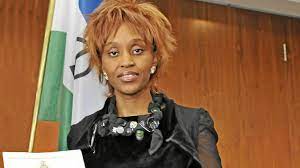
Senate Masupha
On Thursday, Lesotho’s Constitutional Court found that Senate Masupha can’t be a chief because she is someone’s daughter. In so doing, the Court demonstrated how `women’s empowerment’ can be used to deny women power and equality.
Senate Masupha’s father, David Masupha, was a chief. David Masupha died, and his wife, Senate’s mother, ‘Masenate, became chief. Senate Masupha is the first-born child of David and ‘Masenate Masupha. ‘Masenate Masupha died. Senate claimed the chieftaincy, and the situation thickened. Brothers jumped in and claimed that Basotho tradition precluded the daughter from assuming the chieftaincy. Senate replied that this was both nonsense and a violation of her constitutionally guaranteed rights.
And so Senate Masupha challenged the constitutionality of the exclusion of women from chieftaincy.
On Thursday, the brothers won. So did the fathers, uncles, sons, male cousins, male friends and acquaintances and male strangers. Women lost, or at least suffered a temporary setback.
According to many reports, Lesotho has made strides to correct gender inequality and inequity. According to some, Lesotho ranks better than the United States and the United Kingdom on gender equality. 95% of women are literate. Women predominate in the job sector, seem to have ample and rising representation in the highest levels of government. In recent years, Lesotho abolished marital power. So, things are on the move.
But movement goes in both and all directions. The judge decided that Senate Masupha had no case because her mother had been able to assume the chieftaincy. Therefore, since the mother was a woman, women were not discriminated against. Too bad for those women who are daughters.
But really, it’s ok, because women are `empowered’, according to the court judgment: “It is … to be noted that Lesotho has performed well internationally in the campaign for gender equality. It has 58% women in local government, which is more than the 50% requirement. It has also surpassed the initial 30% target for women in decision-making bodies set by SADC. It is ranked number 40 globally in compliance. Our judiciary is also suitably representative in both the Magistrates Court and the High Court…If it could be argued that Lesotho is in fact lagging behind in its policies of equality between the sexes, that may be a fair comment; but it has equally not abolished the death sentence on the basis of the right to life; neither does this country consider itself bound by the principles of the rights of gay people to the extent of allowing same sex marriages. Many countries in the world have not yet developed to that stage. This is not unique at all. It may be that the time will soon come to allow these developments and accede to those principles as well, but the customs, culture and conceptions of the community must always be considered and each country must be allowed to make its choices in this respect. This is the true meaning of independence and self-determination of nations. It is the role of the other two arms of Government to see that is done without breaching the law.”
First, Lesotho is empowering `women’ and so the woman Senate Masupha must simply wait to become one of those `women.’ Second, Lesotho may be behind on equality of the sexes, but it’s also behind on capital punishment and on LGBTI rights, and so it’s all… good? Third, this is what independence and self-determination looks like. You can just about hear the demonstrators in the streets, chanting, “This is what independence looks like! This is what self-determination looks like! Whose streets? Our streets … except, of course, for our daughters.”
The three-strikes policy here is clear. Lesotho has hit the gender and sexual tipping point. Women are sort of equal, and so can’t be discriminated against. What’s good for the mothers will have to do for the daughters.
On the one hand, this is a matter of jurisprudence in one small mountain kingdom. Senate Masupha will appeal, and contemporary African history is on her side. In recent years, courts in South Africa, Botswana, Ghana, Kenya, Nigeria, and Tanzania have all faced similar cases, and have all decided to strike down prohibitions against women becoming chiefs and against women being able to inherit. Lesotho has temporarily chosen another path.
On the other hand, the judgment is a lesson in the pitfalls of development-speak. Metrics of equality that measure this country’s gender gap against that country’s miss the core aspect of equality. Equality is absolute. Either women and men are equal or they are not. That’s it. There are no gradations. There are no qualifications that have the mothers equal but the daughters not. The judge’s decision was not echoing some traditional Basotho `culture’. To the contrary, the judge was invoking precisely the terms of international and global assessment.
Women’s `empowerment’ without the absolute of gender and sexual equality is nothing more and nothing less than an alibi. Ask Senate Masupha, ask Tabitha Phaloane who suffered a similar fate. The struggle continues.
(Photo Credit: Mail & Guardian / PK)
